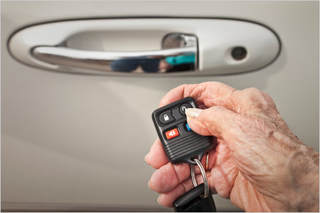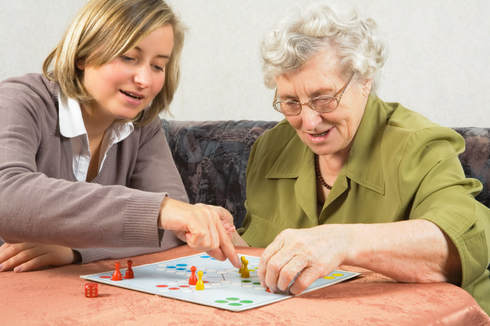|
Not living close to your aging parents can cause stress in determining their level of safety at home. You may be wondering if they should still be driving, are safe in the shower, or if they are exhibiting signs of dementia. Going home for the holidays is an opportunity to observe your aging family members to determine if their physical and cognitive skills are still at a level that allows them to be as independent as they are. Below are a few tips to help gauge their level of safety.
Do you notice any scrapes or bruises they failed to mention or that don't match the story they told you over the phone? This could be a sign that they are falling more often than they'd like to admit. Also check for any dry blood stains on carpet or doorways they may have failed to clean up properly. Is there spoiled food in the refrigerator? They may not be paying as much attention to their nutrition as they once did. Are all of the pills in their pill box filled and/or empty where they should be? How much clean underwear is in the drawer versus in the hamper? Are they changing and washing their clothes often enough? If not, they could either be forgetting to do so or be reluctant to use the washing machine that may be in the basement. Are there cobwebs on the walker they are supposed to be using everyday? Take a look at your parent's car. Does it have scratches and dings it didn't used to? Ask them to take you for a drive to the grocery store and see how they do. Are they making turns as tight as they should? Are they able to turn their neck to see pedestrians and to merge? What was their reaction time like? What about once you're in the grocery store, are they navigating the aisles in a way that makes sense? All of these observations can help you determine if it is time to talk to your parents about getting a little help around the house. It is important not to be obvious or judgemental in any of these situations, but rather to gather the information and think of a calm, non-threatening way to approach them after the holidays. It is vital not to take their independence away, but rather to keep them strong enough to do the things they love while not worrying so much about things that cause them harm. Most importantly, don't let your whole trip be bogged down with worry, enjoy your time with family and friends making great memories.
2 Comments
Driving is a freedom and a privilege we hold onto dearly, it is often times an elderly person's only life line to the outside world. We've all seen the 85 year old woman that we can't believe is in the shape she's in, living a completely independent life. She may be making adjustments like deciding not to drive at night or in the rain, and staying close to home. For others, adjustments just aren't enough.
We may be healthy overall, but age will still bring on it's own struggles. Our vision may become impaired, our hearing may not be what it used to be, and our reflexes slow down. On top of that, many medicines may cause disorientation, dizziness, or dehydration. Arthritis makes it difficult to move our body quickly, making it challenging to slam on the brakes or turn the wheel effectively. Back or neck soreness causes difficulty when turning your heard while switching lanes. All of these things, and more, are risk factors when it comes to safe driving. Very few people are ready and willing to give up their car keys, understandably so. If it becomes necessary, it is important to provide your loved one with alternate means of transportation. Whether that be family, a friend, or a caregiver. They may not be able to get to the grocery store on their own but they should still be given the right to do their own shopping. Aging isn't easy and can lead to some major life adjustments so it's important to continue to live life to the fullest in new, safer ways. James T. asks:
"A friend of mine’s mother recently started needing more help with things like bathing, dressing, and general household duties. His mother’s housekeeper just stepped in and started coming more often to help her with these things. My mother is going to need more help soon too, and I want to know what the difference is between having a family friend or housekeeper help and hiring an agency. I don’t see much of a difference." Lily's Reply: It may seem like the housekeeper or family friend is a better match than a stranger from an agency but there are a few things to consider. Does the housekeeper have any experience or training in elder care? It all may seem so common sense but there are techniques to doing things the “caregiver way” that come with experience and further ensure safety. Another issue to keep in mind when utilizing just one person is, what do you do if they cannot come to work or have a personal issue requiring time off? Who is going to fill in for them? Already being comfortable with someone is absolutely a huge plus but keep two things in mind. Firstly, there may be boundaries that the housekeeper crosses by being a friend that make it difficult to resolve issues or to let them go if something isn’t going great. Secondly, if things do go wrong, you not only lose a housekeeper and caregiver, but a close friend. Most importantly, caregivers through an agency are bonded and the company is insured. If a caregiver causes damage to the home or something goes missing, you are covered. If this happens with a friend, you are likely not protected. We do understand that in some cases, there is no room in the budget to hire someone and having family or a friend step in is the only option. You also don't have to choose one or the other if you need more help, you can have both. At the end of the day, your parent’s safety is most important and ultimately, the decision is yours on what works best for you. If you have a question for Lily, send us an email or join our Facebook page to send a message! *All information is meant as advice based on personal experience and should not be referred to as medical data. When you think of home care, you may automatically think of illness. You are imagining someone in scrubs, spoon feeding a frail grandmother with a blanket on her lap. Yes, many people that are severely ill need around-the-clock, personal care but that is not the only time home care is necessary. Home care is also for people at the early stages of an illness or even for someone with no severe ailments but is simply aging and losing interest in household tasks.
Simple day-to-day tasks, like grocery shopping, doing laundry, changing the sheets, and making meals aren’t so simple when you can’t drive anymore, have arthritis, chronic back pain or fatigue. Having someone to help with things around the house can actually help with independence rather than taking it away. If someone has trouble doing laundry but is still great at cooking, they can focus on cooking while someone else does the laundry. Having someone in the house while you shower can prevent accidents and injuries that could lead to hospitalization and later even more loss of independence. Having someone there to make sure you took your pills properly guarantees better health and therefore avoiding any preventable decline. Let’s say mom loves to get her hair done every Friday but can’t drive anymore. There can be someone there to make sure her clothes are clean by doing laundry, help pick out a great outfit and prepare a nice meal for when she gets back, and provide transportation. Why have mom miss her appointments she’s being going to for 50 years because she can’t do her laundry? What if dad passed away and you are noticing mom hasn’t been herself. She claims she’s okay when you call, but you know she’s not. A caregiver can provided companionship, they can participate in whatever activity she desires, go on walks, or bake old recipes. Mom may not be sick, but without a companion she will likely get depressed dealing with the grief of losing dad. A caregiver won’t replace dad but it will give her something to look forward to, to plan for. Not everyone will be receptive to having help, especially if they aren’t sick. It may take some convincing but what’s important to remember is that bringing in a caregiver is not to take anyone’s independence away, but rather to keep it from disappearing all together. If one day, illness does progress or set in, then you already have someone you trust by your side. A caregiver is there to be what you need them to be, physically and emotionally. |
Location2295 W Market St
Akron, OH 44313 |
|





 RSS Feed
RSS Feed